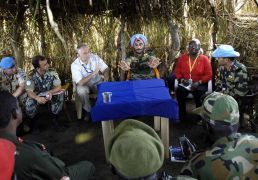UN chief urges removal of remaining troops from South Sudan
August 23, 2007 UNITED NATIONS) — Secretary-General Ban Ki-moon called on the Sudanese military to remove all remaining troops from southern Sudan, expressing disappointment that a July 9 deadline was not met as called for in a 2005 peace deal that ended the 21-year civil war between the mostly Muslim north and mainly Christian south.

In a report to the U.N. Security Council circulated Thursday, Ban said the formation of joint military units comprising government soldiers from the north and former rebels from the south is also significantly behind schedule — and he lamented that supposedly integrated units are operating separately, under different chains of command.
One result, Ban said, has been continuing instability in some areas.
“In southern Sudan, the activities of some regular armed forces and local militias, the exploitation of oil resources and tribal insecurity continue to pose challenges for the protection of civilians,” he said, singling out a May 5 attack by one tribe that left 54 members of another tribe dead, mainly women.
Forming a fully integrated professional army, Ban said, “remains one of the key challenges ahead.”
According to the timelines in the 2005 agreement, formation of the joint units is a prerequisite for the full redeployment of rebel forces from Southern Kordofan and Blue Nile States, Ban said. The joint units are also mandated to protect Sudan’s oilfields, while oil installations are to be demilitarized under the agreement, he said.
Ban, who is expected to visit Sudan next month, strongly urged the two parties to complete the assignment of troops to the joint units, “which is already some nine months overdue.”
While much of the redeployment of Sudanese troops has been carried out as required, Ban said, the Sudanese Armed Forces (SAF) acknowledge that some 3,600 troops remain in the south, though some southern civilian sources, including the governor of Unity State, contend the figure is much higher.
The Sudanese military claims the troops are needed to protect the oilfields until the joint units are fully deployed, but the rebels do not agree, he said.
“I call upon SAF immediately to remove all remaining regular military elements from southern Sudan, with the exception of those earmarked for joint integration units,” Ban said.
Under the 2005 peace deal, former rebels from the Sudan People’s Liberation Movement were given some key positions in the northern government, and both sides agreed to share oil revenues and mark the border between the north and the south.
But Ban said there has been only “incremental progress” on the border issue, an agreement on arrangements for developing a disputed oil concession in Jonglei state is in question because one company involved is dissatisfied, and an agreement on Abeyei, a disputed oil-rich area between northern Sudan’s Kordufan region and the Bahar Ghazal region of southern Sudan, has unraveled.
Despite these setbacks, the secretary-general welcomed recent progress by the Sudanese military and the rebels in reintegrating former members of other armed groups and in trying to resolve disputes over wealth sharing.
Ban also praised the intensive contacts and negotiations by the two sides in their joint executive institution, calling the dialogue “a welcome reaffirmation of their commitment to address critical issues related to the Comprehensive Peace Agreement, to strengthen partnership and to overcome mistrust.”
Ban also addressed two other conflicts elsewhere in Sudan.
In western Darfur, he said, the United Nations and others were redoubling efforts to strengthen peacekeeping and to promote a political settlement of the four-year conflict that has left more than 200,000 people dead and displaced 2.5 million.
In the east, Ban said, after a long period of stagnation, steps have been taken to begin implementing an Oct. 14 peace agreement between the Eastern Rebel Front and the government, ending an intermittent war that lasted for 10 years.
(AP)

YihHon Alewei
UN chief urges removal of remaining troops from South Sudan
The Sudanese military claims the troops are needed to protect the oilfields until the joint units are fully deployed, but the rebels do not agree, he said.
Do we have other observation bodies who can ask the Khartuom government about the above statemnent!
Who are they protect the oilfields from? If observers have a voice in monitoring and report on progress which have been made by the khartuom government! then it shows the only interest from the government is oil but not peace.
The international community and world bodies like UN should have to put pressure on this rogue government which don’t understand the circumstance of the dire it has created for decades!
Southerners are human beings, oppressing them with their rights will not make other South Sudanese living out Sudan excited to vote for unity in the coming elections.
It is bastard, omar needs to remove his troops from the oilfields, nothing will take away their oil.
YihHon Alewei